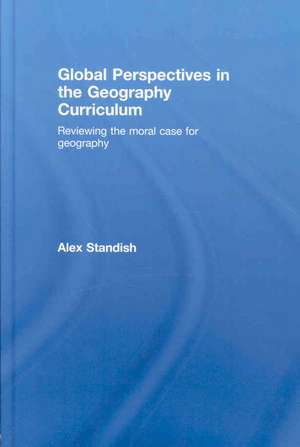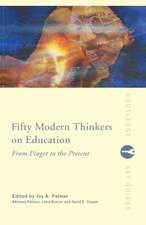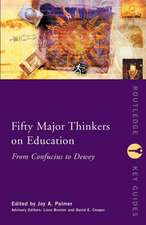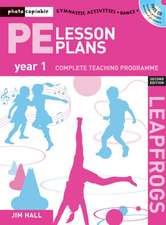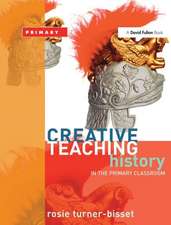Global Perspectives in the Geography Curriculum: Reviewing the Moral Case for Geography
Autor Alex Standishen Limba Engleză Hardback – 7 oct 2008
Prof. Dennis Hayes – Oxford Brookes University, UK
'A prescient and critical analysis of the changing face of geography
teaching. This book deserves to be widely read and debated. Alex Standish's book puts current trends in geography teaching in historical and critical context. It comprises a forthright and timely defence of geographical education for its own sake.'
Dr Jim Butcher, FRSA, Department of Sport Science, Tourism and Leisure, Canterbury Christ Church University.
Since the early 1990s, educational policy makers and some subject leaders have been seeking to fundamentally change the teaching of geography in UK and US schools, from a subject which encourages students to explore spatial concepts, ideas and skills, to a more ethics based subject concerned with the promotion of environmentalism, cultural diversity and social justice. In this book the new approach is critically examined, within a historical and ideological context, addressing a number of fundamental questions:
- Should geography be used as a tool for the delivery of citizenship ideals? How does this affect the intellectual and moral value of geographical education for young people?
- If the state and teachers are taking more responsibility for the values, attitudes and emotional responses of students, how will they learn to develop these qualities for themselves?
- If global perspectives shift the focus of education from learning about the outside world to learning about the self, what is its vision of social progress and conception of social change?
A vital resource for teachers and student teachers alike, <I>Global Perspectives in the Geography Curriculum<$> makes a significant contribution to the growing debate about the future direction of the discipline itself.
| Toate formatele și edițiile | Preț | Express |
|---|---|---|
| Paperback (1) | 384.59 lei 6-8 săpt. | |
| Taylor & Francis – 7 oct 2008 | 384.59 lei 6-8 săpt. | |
| Hardback (1) | 1054.75 lei 6-8 săpt. | |
| Taylor & Francis – 7 oct 2008 | 1054.75 lei 6-8 săpt. |
Preț: 1054.75 lei
Preț vechi: 1286.28 lei
-18% Nou
Puncte Express: 1582
Preț estimativ în valută:
201.83€ • 215.82$ • 168.28£
201.83€ • 215.82$ • 168.28£
Carte tipărită la comandă
Livrare economică 18 aprilie-02 mai
Preluare comenzi: 021 569.72.76
Specificații
ISBN-13: 9780415468954
ISBN-10: 0415468957
Pagini: 224
Ilustrații: 2 tables, 2 halftones and 9 line drawings
Dimensiuni: 156 x 234 x 18 mm
Greutate: 0.45 kg
Ediția:1
Editura: Taylor & Francis
Colecția Routledge
Locul publicării:Oxford, United Kingdom
ISBN-10: 0415468957
Pagini: 224
Ilustrații: 2 tables, 2 halftones and 9 line drawings
Dimensiuni: 156 x 234 x 18 mm
Greutate: 0.45 kg
Ediția:1
Editura: Taylor & Francis
Colecția Routledge
Locul publicării:Oxford, United Kingdom
Cuprins
Introduction 1. The Evolution of a Discipline and its Instrumental Applications 2. Geography’s Ethical Turn 3. From Counter-Cultural Movement to Global Values in the US Geography Curriculum 4. Global Citizenship and the Geography Curriculum in England and Wales 5. The Geography of Culture or Respecting Cultural Diversity? 6. Approaches to Teaching Global Issues 7. Global Issues in the Geography Curriculum 8. Global Advocacy and the Cosmopolitan Citizen in the Curriculum (with contributing material from Vanessa Pupavac) Conclusion
Notă biografică
Alex Standish is Assistant Professor of Geography, Western Connnecticut State University, US.
Recenzii
‘This book not only sheds light upon how geography disciplines its subjects, but also on how society is disciplining the subject of geography.’ Dr Jonathan Pugh, Senior Academic Fellow in Territorial Governance and Director of "The Space of Democracy and Democracy of Space" network, University of Newcastle Upon Tyne.
'A prescient and critical analysis of the changing face of geography
teaching. This book deserves to be widely read and debated. Alex Standish's book puts current trends in geography teaching in historical and critical context. It comprises a forthright and timely defence of geographical education for its own sake.' Dr Jim Butcher, FRSA, Department of Sport Science, Tourism and Leisure, Canterbury Christ Church University.
‘For geographers across the globe this book provides the arguments for a return to the teaching of geography and why they should reject the politicisation of the subject by education policy makers and politicians. Standish’s careful critique shows the necessity of a depoliticised geography curriculum the irony of which would be that it would ensure that every child could point to Iraq, Iran and Afghanistan on a map.’ Prof. Dennis Hayes – Oxford Brookes University, UK
I strongly recommend this book proposal. Alex Standish is establishing a unique niche and expertise in this field. As set out, it would draw upon wide ranging expertise in an area which Dr Standish is carving out as his own, in both academia and the wider media. As such it would fill a gap in the market for not only academics, but any of those interested in the nature of citizenship education today. Given his previous publications, this book would no doubt be clearly written. The combined elements of pitch and style of writing hit on a crucial theme; how are citizens shaped through citizenship education in geography? This book would not only shed light upon how geography disciplines its subjects, but also on how society is disciplining the subject of geography.
Dr Jonathan Pugh, School of Architecture, Planning and Landscape, University of Newcastle Upon Tyne.
1. Is there a real need…
Yes, in the sense that this book looks at a debate in Geography education that is current and topical, and on which little has been written. It looks at the heart of what Geography is about, and will be a major contributor to a debate that rumbles on.
The author mentions numbers in the different geographers’ organisations. In addition, I would think any University library featuring geography and / or education should have some copies of this title. The book has something important to say about pedagogy beyond Geography, too, and that may expand the potential readership.
2. How would it be used
The book would feature on the reading lists of teacher trainers and trainees in education for whom Geography is one of their subjects. In addition, the book will attract a lot of attention amongst geographers generally, on both sides of the Atlantic and around the world. The focus on USA and UK is very good in this respect, as the trends the book examines, whilst global, are perhaps best expressed in these two countries.
3. Reasonable price?
I would like to see it in paperback at about £18 (and hardback at whatever the price is) , as I think this would facilitate a wide readership amongst geographers. The book will probably be used quite widely as a point of reference in a debate which is in the ascendancy,
4. There are no books, to my knowledge, on this topic. There have been some prominent people who argue along the lines of the book at the Royal Geographical Society conference over a number of years, and some interesting papers. However, this book sets out the doubts over the curriculum changes and offers a coherent, historical and theoretical analysis. That is a major step forward in the debate.
The author mentions a couple of books as competing titles. However, these books tend to report the changes, and in 2 cases are really advocacy books for the new curriculum. This book takes issue with the developments and in that respect is unique. It will be read by the adherents to the ‘new agenda’ and those who question it.
5. As a point of reference for what has changed it won’t really date. It also establishes a trajectory which is likely to continue for some time - many years I would think. ‘Values’ in education, and in particular in Geography (the subject for today’s global citizen) are prominent and will remain so.
6. The author could best be described as a rising talent in geography education – an enfant terrible with some thing new to say, unfazed by challenging some orthodoxies. I admire him for that. The proposal is very maturely written, and the book will, I think, influence geography teachers and geographers quite widely.
7. This is not a main text book – it does not try to say everything about Geography education. However, it does say a lot about its development, and therefore would be recommended reading / supplementary text book for students of geography education (and indeed education generally in some cases). Moreover, it is comprehensive on the ‘moralisation of geography’, a phrase that will become a point of reference once the book gets read amongst geographers.
8. I would definitely recommend publication. I would look forward to reading it myself. The title is very attractive – although ‘moralisation’ can be used in different ways (e.g. some see the ‘remoralisation’ of politics as a good thing, whilst here it is taken more to mean replacing subject knowledge with moralising) – it is an excellent handle for the book, and will become a reference point. The second half of the title could be reconsidered. ‘Approaches to Teaching Global Perspectives in the 21st Century’ does tend to suggest a dispassionate survey of different views, rather than establishing a line of reasoning, a reference point, in the discussion. I would drop the ‘approaches to’, but that is a very small point.
9. I enjoyed reading the proposal. I think the book will really break some original ground. Many will agree with its questioning attitude to changes in the curriculum and to the contemporary mission of geography. It establishes a counterpoint to a number of other books. Some will, to a greater of lesser extent, agree the author.
Some will disagree and defend the ‘new agenda’. Either way, many will want to read this book.
Dr Jim Butcher, Canterbury Christ Church University
'A prescient and critical analysis of the changing face of geography
teaching. This book deserves to be widely read and debated. Alex Standish's book puts current trends in geography teaching in historical and critical context. It comprises a forthright and timely defence of geographical education for its own sake.' Dr Jim Butcher, FRSA, Department of Sport Science, Tourism and Leisure, Canterbury Christ Church University.
‘For geographers across the globe this book provides the arguments for a return to the teaching of geography and why they should reject the politicisation of the subject by education policy makers and politicians. Standish’s careful critique shows the necessity of a depoliticised geography curriculum the irony of which would be that it would ensure that every child could point to Iraq, Iran and Afghanistan on a map.’ Prof. Dennis Hayes – Oxford Brookes University, UK
I strongly recommend this book proposal. Alex Standish is establishing a unique niche and expertise in this field. As set out, it would draw upon wide ranging expertise in an area which Dr Standish is carving out as his own, in both academia and the wider media. As such it would fill a gap in the market for not only academics, but any of those interested in the nature of citizenship education today. Given his previous publications, this book would no doubt be clearly written. The combined elements of pitch and style of writing hit on a crucial theme; how are citizens shaped through citizenship education in geography? This book would not only shed light upon how geography disciplines its subjects, but also on how society is disciplining the subject of geography.
Dr Jonathan Pugh, School of Architecture, Planning and Landscape, University of Newcastle Upon Tyne.
1. Is there a real need…
Yes, in the sense that this book looks at a debate in Geography education that is current and topical, and on which little has been written. It looks at the heart of what Geography is about, and will be a major contributor to a debate that rumbles on.
The author mentions numbers in the different geographers’ organisations. In addition, I would think any University library featuring geography and / or education should have some copies of this title. The book has something important to say about pedagogy beyond Geography, too, and that may expand the potential readership.
2. How would it be used
The book would feature on the reading lists of teacher trainers and trainees in education for whom Geography is one of their subjects. In addition, the book will attract a lot of attention amongst geographers generally, on both sides of the Atlantic and around the world. The focus on USA and UK is very good in this respect, as the trends the book examines, whilst global, are perhaps best expressed in these two countries.
3. Reasonable price?
I would like to see it in paperback at about £18 (and hardback at whatever the price is) , as I think this would facilitate a wide readership amongst geographers. The book will probably be used quite widely as a point of reference in a debate which is in the ascendancy,
4. There are no books, to my knowledge, on this topic. There have been some prominent people who argue along the lines of the book at the Royal Geographical Society conference over a number of years, and some interesting papers. However, this book sets out the doubts over the curriculum changes and offers a coherent, historical and theoretical analysis. That is a major step forward in the debate.
The author mentions a couple of books as competing titles. However, these books tend to report the changes, and in 2 cases are really advocacy books for the new curriculum. This book takes issue with the developments and in that respect is unique. It will be read by the adherents to the ‘new agenda’ and those who question it.
5. As a point of reference for what has changed it won’t really date. It also establishes a trajectory which is likely to continue for some time - many years I would think. ‘Values’ in education, and in particular in Geography (the subject for today’s global citizen) are prominent and will remain so.
6. The author could best be described as a rising talent in geography education – an enfant terrible with some thing new to say, unfazed by challenging some orthodoxies. I admire him for that. The proposal is very maturely written, and the book will, I think, influence geography teachers and geographers quite widely.
7. This is not a main text book – it does not try to say everything about Geography education. However, it does say a lot about its development, and therefore would be recommended reading / supplementary text book for students of geography education (and indeed education generally in some cases). Moreover, it is comprehensive on the ‘moralisation of geography’, a phrase that will become a point of reference once the book gets read amongst geographers.
8. I would definitely recommend publication. I would look forward to reading it myself. The title is very attractive – although ‘moralisation’ can be used in different ways (e.g. some see the ‘remoralisation’ of politics as a good thing, whilst here it is taken more to mean replacing subject knowledge with moralising) – it is an excellent handle for the book, and will become a reference point. The second half of the title could be reconsidered. ‘Approaches to Teaching Global Perspectives in the 21st Century’ does tend to suggest a dispassionate survey of different views, rather than establishing a line of reasoning, a reference point, in the discussion. I would drop the ‘approaches to’, but that is a very small point.
9. I enjoyed reading the proposal. I think the book will really break some original ground. Many will agree with its questioning attitude to changes in the curriculum and to the contemporary mission of geography. It establishes a counterpoint to a number of other books. Some will, to a greater of lesser extent, agree the author.
Some will disagree and defend the ‘new agenda’. Either way, many will want to read this book.
Dr Jim Butcher, Canterbury Christ Church University
